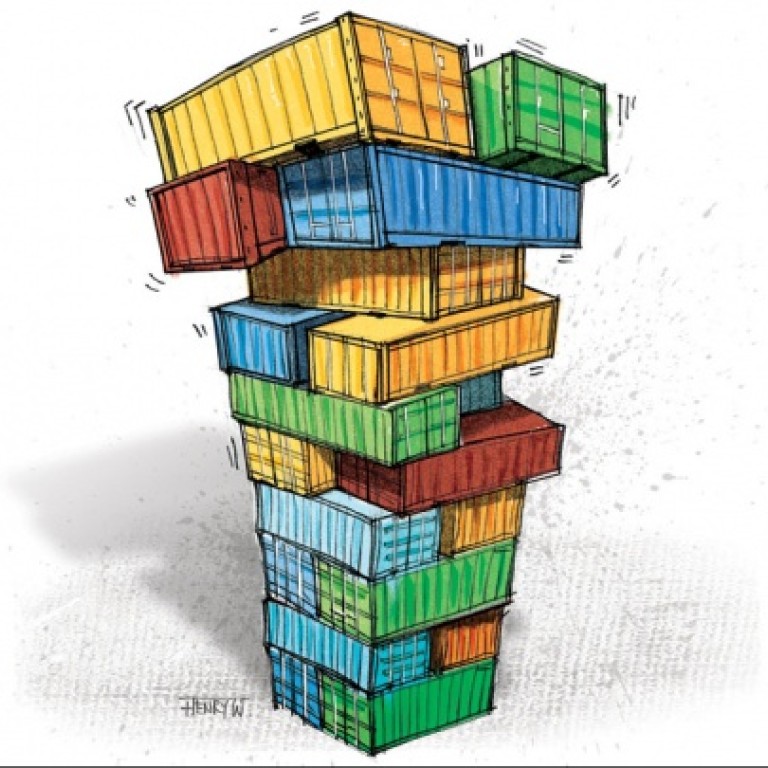
Leave political grandstanding out of negotiations over dockers' dispute
John Meredith says political grandstanding must not be allowed to prevent a resolution to the dockers' strike, which is causing harm to Hong Kong's business as it drags on, to everyone's loss
After decades of investment and growth that once established it as the largest port facility in the world, the port of Hong Kong now risks losing business and its global leadership to competitors from Singapore, Taiwan, Japan, Korea, Malaysia and mainland China. These lost cargoes would adversely affect not only the dockers but thousands of others who are involved in related businesses in Hong Kong's pivotally important logistics chain.
For those of us anxious to agree on a positive outcome to the current dispute between striking dockworkers and their employers, a simple basic reality needs to be recognised. Hong Kong's port operators have achieved world leadership by being efficient and cost-effective. The waterfront is not an easy or simple business: it involves tough negotiations with customers on fees and charges as well as with our employees and supporting companies. Negotiations may be tough but they are always in good faith: we share a keen interest in reaching an agreement that can be valued and respected by all parties.
Stirred by a union and its leader that is more concerned with scoring political points than an agreement that secures the livelihoods of these contracted workers, the need for negotiation in good faith has been abandoned. This is perhaps the most disappointing aspect of the current stand-off.
These attacks, together with the claims that Hongkong International Terminals (HIT) has failed to respond to the needs of the industry and the welfare of those working in it, do both an injustice to the staff and are additionally an insult to those of us who are intensely proud of the revolutionary business model that started in Hong Kong, has benefited our great city, and in the process enabled Hong Kong to become a world leader in its field.
Not only are the activities of the Confederation of Trade Unions deceptive, they are dangerous. A crucial point to remember with transhipment cargoes is that they do not have to come through Hong Kong. They can choose to transit at many other ports, and if we lose the trust of the shipping lines to deliver the right product at the right price, then our transhipment traffic will be lost. In fact, a number of transhipment cargoes have already bypassed us, and if our costs increase or our efficiency becomes uncertain, the business won't be coming back.
This does not seem to matter to Lee Cheuk-yan of the CTU, nor do the other facts that he chooses to ignore; his overall strategy being to directly attack Hutchison Whampoa chairman Li Ka-shing with Cultural Revolution-style banners and slogans and by protesting at Mr Li's residence and Hutchison Whampoa retail stores.
The dockers involved in the recent industrial action at the port work for independent contracting companies. They do not work directly for HIT. Lee Cheuk-yan of CTU knows this, yet he is dramatically focusing on Hutchison Whampoa, HIT and Mr Li personally.
Even if the dockers worked for HIT, the company is part of Hutchison Port Holdings Trust, a listed entity on the Singapore exchange, which has an independent board and governance. Hutchison Whampoa holds only a 27.6 per cent stake in Hutchison Port Holdings Trust, and HIT contributes less than 1 per cent to Hutchison Whampoa's overall profit.
What the union leaders and those who follow them choose to ignore is the delicate economic balance that must be maintained to keep the port of Hong Kong operating. The fact is that over 70 per cent of the port's business involves comparatively low-value transhipment cargoes which originate in places like Thailand and Vietnam and are transported in small ships to a hub port, such as Hong Kong, where they are transferred to larger vessels for their eventual destination to the US, Europe and other markets.
HIT has spent 45 years building a successful transhipment operation with facilities specially designed to serve what once was a revolutionary concept for port cargo handling. Mr Li and Hutchison risked investment to grow the industry in Hong Kong even at times when others were hesitant or unwilling, and it has proven beneficial to all.
This dedicated investment and corporate leadership allowed HIT to build up resources required for transhipment traffic and to field a workforce accordingly. This has resulted in the port of Hong Kong becoming a premier transhipment hub in the region, fiercely competitive in terms of operational efficiency, price, quality and consistency.
Yet the model has its challenges. The transhipment business is inconsistent. Container volumes rise and fall week to week, due to a whole host of factors outside our control. Competition is fierce, particularly among developing countries that would very much like to take our place by undercutting the narrow margins we must maintain to be competitive.
To keep the port of Hong Kong successful and benefit the many who depend on it, we have established baseline resources but must also depend on external contractors whenever the workload rises above a point at which we cannot operate effectively. They are a key component of our successful model, and we value their contribution. Negotiation in good faith can settle this dispute. Grandstanding theatrics cannot.
